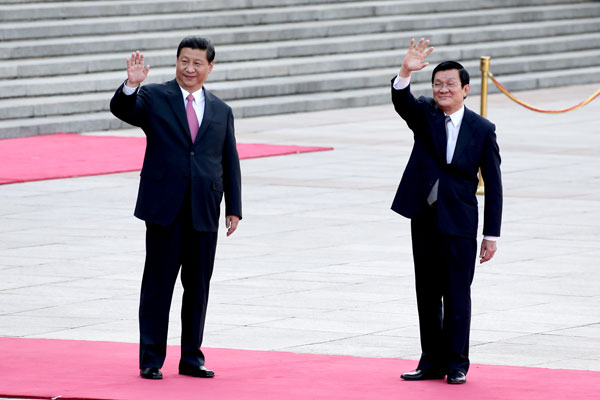Talks establish fishery hotline
|
 |
|
President Xi Jinping welcomes his Vietnamese counterpart Truong Tan Sang in Beijing on Wednesday. Photo by Wu Zhiyi / China Daily |
Beijing, Hanoi vow to prevent disputes from derailing ties
Agricultural authorities from Beijing and Hanoi agreed on Wednesday to establish a fishery emergency hotline, as the leaders of the two countries vowed to prevent disputes from derailing ties.
On his first official trip to China, Vietnamese President Truong Tan Sang and President Xi Jinping also witnessed the signing of another nine agreements in areas including defense, economy and public diplomacy.
Analysts said there were concrete results for both leaders, which laid a sound foundation for bilateral ties and an early resolution of disputes.
Amid media limelight and public attention, Sang started his three-day China visit — the first by a Vietnamese leader since the new Chinese leadership was unveiled in March — on Wednesday.
Beijing placed a great emphasis on the visit. The welcoming ceremony was marked with a 21-gun salute outside the Great Hall of the People, where the Vietnamese leader was also greeted by Chinese elementary school students.
The talks were also extended for a frank discussion, during which both sides agreed to ensure stability in the South China Sea and make sure disputes do not detract from overall diplomatic ties.
Xi said the key for a political resolution of the South China Sea issue "lies in securing stability and advancing cooperation". Both sides should stick to reconciliation rather than any moves that may complicate or internationalize the issue, he added.
Sang said Hanoi yearns to enhance neighborly friendship, "boost mutual trust and properly handle disputes".
"With the establishment of the fishery hotline, each side should be informed of any detainment or treatment by the other side involving fishermen or fishing boats within 48 hours," said Wang Ying, director of the Department of International Cooperation at the Ministry of Agriculture.
The agreement did not mention territorial issues, and "it aims to facilitate working practices and is conducive for dealing with emergencies", Wang said.
China and Vietnam have seen their ties overshadowed by accidental maritime confrontations, which in some cases were not reported in a timely manner to the other side.
"The agreement is a promise, which needs a good implementation," Wang said.
Observers said the overall relationship between the two neighbors is expanding, the only exception being the South China Sea issue — in which both sides are endeavoring to make progress.
Li Guoqiang, deputy director of the Center for Chinese Borderland History and Geography at the Chinese Academy of Social Sciences, said the fishery hotline was "a good start" for solving differences and a wider range of cooperation.
"The hotline is a transitional measure, and both sides have a long way to go for the resolution of territorial disputes," Li said.
In 2011, Beijing and Vietnam signed the Agreement on Basic Principles Guiding the Settlement of Maritime Issues, laying a foundation for friendly consultation on and a proper solution to the maritime issues.



























